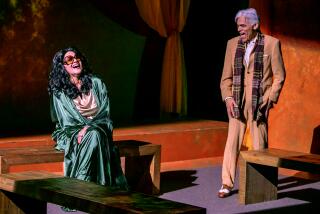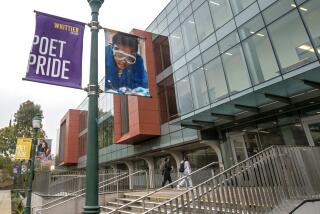Scholars Get Liberties, Work Like Crazy
They are described as overachievers who like to take risks and control their own destinies. Senior Chris Marshall contends there is another, less cerebral characteristic shared by those who enroll and excel in Whittier College’s Scholars Program:
“You have to be a little crazy.”
Marshall, 22, a theater arts major, should know. He recently wrote, scored, staged and conducted a three-hour opera, “The Serpent’s Tooth,” while taking a full class load at the small liberal arts college. The production involved 22 cast members, 150 hours of rehearsals and a $1,000 budget. It was his senior project, a final exam of sorts after four years in the Scholars Program.
“There was a lot of pressure,” said Marshall, recalling the hectic week before opening night in late January. “More than once, I said to myself, ‘You’re crazy, Chris.’ But that’s the value of the Scholars Program. It pushes you to the brink. In the end, you’re a stronger person.”
Marshall is the epitome of those drawn to the Scholars Program, an alternative to the traditional and more heavily traveled route to graduation.
Design Own Curriculum
Students design their own curriculum, selecting classes that closely mesh with their interests and career choices, rather than following a prescribed path of required courses.
The program’s freedom is its major selling point, one that lured Marshall west to Whittier College in 1981 after high school in Colorado.
Its reputation also has drawn others to the hillside campus, alma mater of former President Richard M. Nixon. One student even crossed the Atlantic to study math at the college, which was started nearly a century ago by Quakers.
“He’s from Paris, and his story is typical,” said Richard Archer, a history professor and director of the Scholars Program. “A majority of those in the program are here because of what we’ve created.”
About 10% of the college’s 1,000 undergraduates are enrolled in the Scholars Program and the number is growing, Archer said.
Anyone Is Eligible
Any Whittier College freshman or sophomore is eligible; there are no grade requirements to meet. Applicants submit a blueprint for obtaining a degree to a panel of professors, who review the proposed area of study and course list--a package known as a student’s “educational design.”
Initially, the program attracted mostly sociology and theater arts majors, but business, computer science and pre-med majors are now enrolled.
“This program is kind of out of step with the times,” said Archer, 43, one of the forces behind its creation seven years ago.
Ten or 15 years ago the Scholars Program would have been one of many across the country at colleges and universities offering students a chance to plot their own courses to graduation, Archer said. But the experimentation found in college classrooms in the late 1960s and ‘70s has given way to a more traditional approach.
“Education, like everything else, is cyclical, and the pendulum simply started swinging back toward a more conservative approach,” Archer said.
Flexible Curriculum
Whittier College officials, however, believed there was room--and a need--for a more flexible curriculum, one that allowed students room to roam in academe to find their direction.
“Most students want structure,” said Richard J. Wood, Whittier College’s vice president for academic affairs and dean of faculty. “But there is a segment of students that is different; they want to make decisions about their curriculum. They want a chance to control their own academic direction.”
Cathy Pearce, a 1982 Scholars Program graduate who now coordinates grants for medical research at the University of California, Irvine, agreed:
“For better or worse, I’m an overachiever who likes control. So it wasn’t enough for me to sit back and let someone else--the faculty or administration--make decisions for me.”
Although flexibility is the program’s hallmark, there are strings attached. As the 16-page booklet describing the program says, “Although it is individualized, it does not support the idea that anything goes.”
Senior Project
Like other undergraduates, those in the Scholars Program must complete 120 units to graduate. In addition, students must do a senior project, which is worth a minimum of three units, roughly 150 hours of work. A faculty panel, including Archer, continually reviews a student’s curriculum, progress and senior project. Almost any change must be justified and defended before the panel.
“Sometimes, it’s like being a specimen under a microscope,” said one student. “At times, all this talk about freedom is just an illusion.”
Archer concedes that students are monitored closely, a necessity, he argues, because of the independence they are given. About 30 instructors from a cross section of disciplines give time to the program, sitting on review panels and advising students on course choices and direction.
To consolidate the program, Archer and several other professors have moved their offices into Wardman Hall, a two-story dormitory on campus where about a quarter of the 95 scholars students live.
“This is the hub of the Scholars Program,” Archer said during an interview in his office at Wardman, a stately structure with peeling paint and a red-tiled roof. Around campus, the aging dorm on a knoll overlooking the central quad is known as “Scholars Hall.”
‘Just Makes Sense’
“It just makes sense to be here,” said Archer, who came to Whittier College from Central Michigan University in the early 1970s.
“This is where we hold scholars seminars; where the students gather, talking about everything from senior projects to rock music. Because the program is only as good as the relationships between students and teachers, we felt it was important to encourage those ties.”
This close-knit, family-like approach has paid dividends. Archer said about 90% of those in the program graduate, many of them going on to graduate work at larger institutions such as the University of Michigan, Tufts University, Cornell and Harvard.
Jeanete Wong, 25, may become the program’s first graduate to receive a doctorate. Now a student at USC, Wong is working on a Ph.D. in piano performance and composing.
She enrolled at Whittier College to pursue music. Growing up in Monterey Park, she consistently placed in the top 5% academically in her high school class. But she grew weary of all the science, chemistry and math classes.
“That’s the beauty of the Scholars Program,” she said. “I’m a strong student and didn’t feel that I needed to take all those courses again. I wanted to concentrate on music.”
Rather than being required to take a large number of courses unrelated to her major, she was able to concentrate on music classes.
“I took an extra 20 units in music,” she said. “It was wonderful--it gave me a running start on graduate school.”
Backlash Was Feared
When the Scholars Program began, Archer and others worried about a backlash or rift developing between those in the program and the rest of the student body.
Although the program is open to anyone, Archer acknowledges that many of the program’s students are among the college’s brightest.
“It attracts the highly motivated student who is disciplined and normally scores in the top percentile on college entrance exams,” Archer said.
Campus officials go to great lengths, however, to discourage the “honors program” label sometimes attached to the Scholars Program.
“This is not a program that takes the top 10% and puts them into a separate building, isolating them from the rest of the student body,” said Wood, the academic affairs vice president. “They enrich our campus by giving it diversity. But they are not a special class of students.”
Stacy Hornaday, a senior from La Mirada and a theater arts major, said she has not experienced any resentment from those outside the program.
“The only real difference is some of us live in Wardman Hall,” said Hornaday, who performed a series of monologues and dramatic scenes for her senior project. “In the end, if you matched my transcript against one from someone not in the Scholars Program, I’m not sure they’d be all that different. What is different is the feeling that you’ve got a voice in what you’re doing.”
Pearce, the UCI grant coordinator who graduated with the first Scholars Program class (“the guinea pig class,” she calls it) believes the program gives its graduates an edge in the professional world.
‘Gut-Wrenching Process’
“Defending your curriculum before the faculty panel is an emotional, gut-wrenching process,” she said. “You must justify your choices until you’re blue in the face. But in the end you know not only what you’re taking, but why. And as a result, I’m now asking the same tough, probing questions in my own work. I’m more confident about my decisions.”
Attending Whittier is not cheap. A full-time undergraduate pays yearly tuition of $7,300, in addition to room and board of $2,910 and student fees of $186. But most say it is worth it.
“It’s hard to find the one-on-one attention you get in the program at other colleges,” Marshall said.
At the core of the Scholars Program is the senior project.
Hornaday’s one-woman show, nearly two hours of costume and mood changes scripted to demonstrate the range of her acting abilities, was 18 months in the making. In one scene, from a Lily Tomlin skit, she portrayed a woman distraught over learning there is suddenly a worldwide shortage of plastics. Hornaday wears a Day-Glo orange outfit as she panics over the threat to her synthetic world--”Baggies, spatulas, shower curtains, Astroturf, Parcheesi dice and leisure suits.”
“The show was an important step because I was all alone on stage,” Hornaday said. “There was nobody else to play off of. I had to reach deep to pull off the various characters.”
Other senior projects by scholars students have included a yearlong examination of press coverage of the war in El Salvador and interviews with Vietnamese refugees after they had landed by boat in Malaysia.
New Breed
“The senior project is more of a learning experience than any classroom situation,” said opera composer Marshall, who plans to study music conducting when he graduates from Whittier College this spring.
Students like Brent Gray, 20, are one reason the Scholars Program is growing. He is a junior pre-med student, one of the new breed moving into the program.
In a field that normally has little leeway in course selection, Gray said the Scholars Program has allowed him to take several courses not normally included in a pre-med curriculum. Gray is leaning toward obstetrics, with an emphasis in patient counseling.
“There is a growing need in medicine for stronger patient counseling,” he said. “So I wanted to take more psychology classes to work on this skill.” He is also taking such courses as bioethics, a look at such medical issues as animal heart transplants into humans.
Gray said he entered the Scholars Program because “Archer is a real good salesman. He convinced me it would be better to be a pioneer, trying something new rather than being another run-of-the-mill student.”
More to Read
The biggest entertainment stories
Get our big stories about Hollywood, film, television, music, arts, culture and more right in your inbox as soon as they publish.
You may occasionally receive promotional content from the Los Angeles Times.










